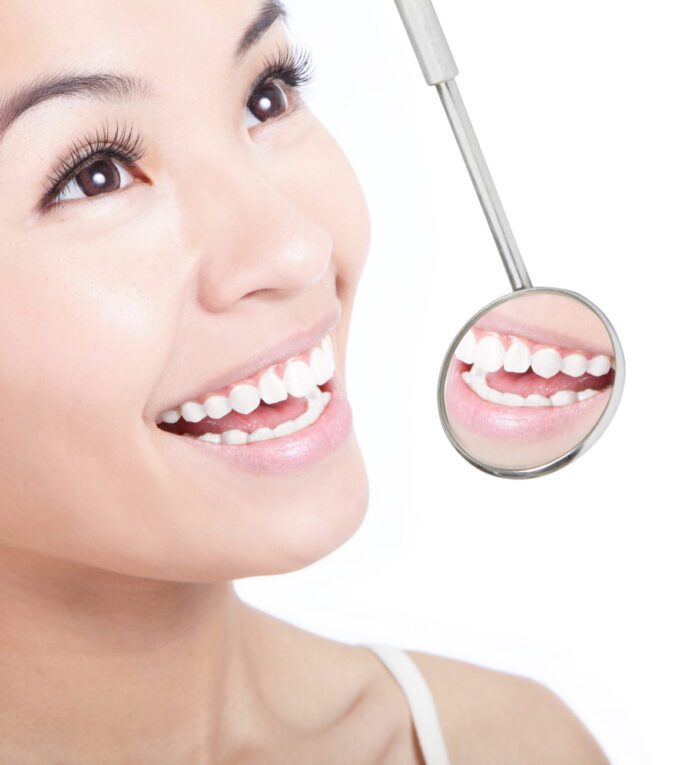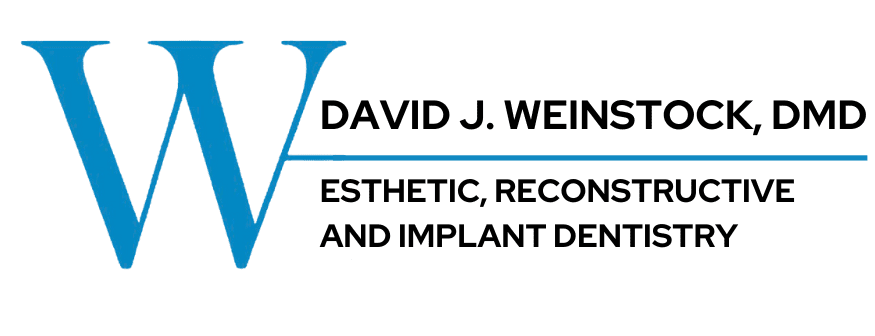Gum health is vital for the health and well being of your smile. Twice a year visits to your dentist for a teeth cleaning can help keep your teeth and gums healthy. Periodontist Dr. David Weinstock provides dental cleanings and fluoride treatments as part of our preventative oral health care routine. Teeth cleanings are one of the most important dental services Dr. Weinstock provides to all patients.
Dental Cleaning in Philadelphia, PA
Teeth cleanings help remove plaque and tartar build up that daily brushing and flossing can not. Teeth cleanings use state of the art tools to clean all surfaces and crevices of your teeth and soft tissues. This will lower your chance of decay, gum disease, and tooth loss. Dental cleanings can also help keep your teeth whiter and your breath fresher.

What is plaque and tartar?
Plaque is a sticky film that builds up on your teeth from food. It contains bacteria and you have to remove it every day because of this. Practicing good oral hygiene by brushing your teeth twice a times a day and flossing daily toot will remove the plaque from your mouth. The bacteria found in plaque causes gum disease and tooth decay.
Tartar is hard calcified deposits that build up on your teeth and gums when you do not remove plaque, food particles and bacteria from your teeth on a regular basis. If you have tartar buildup, your dentist must remove it during a dental cleaning. If left untreated, this buildup will lead to tooth decay.
What to Expect at Your Dental Cleaning in Philadelphia, PA
At each dentist appointment, a hygienist will screen for dental problems and clean your teeth. They will also use a tiny mirror to check your teeth and gums, looking for signs of decay and gum disease. If any issues are present, they will take note of it to share with Dr. Weinstock.
Next, the hygienist will use the tiny mirror and a tool called a scaler to remove the plaque and tartar buildup from in between your teeth and your gum line. They will scale each tooth to ensure all tartar is removed. The more plaque and tartar present in your mouth, the longer and more uncomfortable this part may be.
Using a handheld electric brush, the hygienist will polish your teeth with a gritty, toothpaste. When they are done, you will be left with a fresh, clean smile. And more importantly, you are plaque and tartar-free with less risk of developing gum disease or tooth decay.
Fluoride Applications
Fluoride is a naturally occurring element that prevents tooth decay when ingested during tooth development and topically when applied to teeth. Systemic fluorides are those that are ingested into the body and become incorporated into newly forming teeth.
Systemic fluorides taken regularly during the time when teeth are developing (6 months to 16+ years of age) are deposited throughout the entire tooth surface and provide long lasting protection than those applied topically.
You get it from fluoride in water, dietary fluoride supplements in the forms of tablets, drops or lozenges, and fluoride present in food and beverages. Topical fluorides make the teeth already present in the mouth stronger. It absorbs into the surface of the teeth, protecting them from tooth decay.
Topical fluorides include toothpaste, mouth rinses, and professionally applied fluoride gels, foams, and rinses.
Researchers have observed fluoride’s decay-preventive effects in three specific ways:
- Fluoride makes tooth enamel harder and more resistant to the acid that causes tooth decay.
- It reduces the ability of dental plaque organisms to produce acid.
- Fluoride promotes the remineralization (repair) of tooth enamel in the early stages of tooth decay.
Dental Cleanings FAQs
A dental cleaning is a simple procedure that we recommend twice a year. While simple, it is vital to your oral health and will contribute to your overall well-being. If you have any questions or concerns, please contact our dental office during regular office hours. The following are frequently asked questions about dental cleanings.
Do adult teeth benefit from fluoride treatments?
Fluoride benefits people of all ages in two ways. Studies have clearly shown that fluoride in an adult’s mouth when decay is forming can stop the stop it make the tooth’s surface more resistant to future acid attacks. Also, fluoride in saliva provides a reservoir of fluoride ions that can be incorporated into the tooth surface to prevent decay.
Is fluoride in tap water safe to drink?
Since the 1930s, hundreds of studies have shown that fluoride in water has no harmful effects. Fluoridation of community water supplies is a valuable public health measure supported by the American Dental Association, the World Health Organization, the U.S. Public Health Service, the American Medical Association, and the American Cancer Society.
Does bottled water or well water provide fluoride protection against decay?
Most bottles of waters on the market do not contain a good level (0.7-1.2 ppm) of fluoride. Additionally, reverse osmosis home treatment systems remove a lot of the fluoride from the water supply. Consumers of well water, or who use home water treatment systems, should have their water tested each year get a fluoride level. Testing is available through local and state public health departments. Private labs may also offer testing for fluoride levels in the water.
What types of fluoride products are available?
Fluoride supplements are available only by prescription. They are available in two forms: drops for infants aged six months and up, and chewable tablets for children and adolescents.
There are many topical fluoride rinses, gels, pastes and foams that are available either as office treatments or by prescription. Dr. Weinstock may suggest a prescription fluoride tooth paste. Many store bought products are useful as well. Your dentist or hygienist will be happy to discuss which of these products may be of benefit to you.
Are dental cleanings painful?
Dental cleanings are not typically painful. During the procedure, your dental hygienist will use special tooth to remove plaque and tartar and polish your teeth. You may, however, experience some minor discomfort or sensitivity, but it is generally manageable. We are committed to making sure our patients are comfortable during every appointment, even dental cleaning. We can use local anesthesia for particularly sensitive areas or sedation dentistry if you suffer from dental anxiety.
Can dental cleanings prevent bad breath?
Yes, dental cleanings can help you prevent bad breath (halitosis). A teeth cleaning will remove plaque, tartar, and bacteria from your teeth and gums. This is the number one underlying cause of bad breath. Additionally, we can identify and address oral health issues that may be contributing to your bad breath. Twice a year dental cleanings will ensure you have fresh breath and proper oral health.
Are dental cleanings covered by insurance?
Yes, dental cleanings are typically covered by dental insurance plans. Many insurance policies fully or partially cover preventive services, which includes dental cleanings. This will include two annual teeth cleanings. However, coverage details vary per patient. We encourage each patient to check their specific insurance plan or consult the insurance provider to understand the extent of their coverage for dental cleanings.
Can dental cleanings detect gum disease?
Yes, dental cleanings can detect gum disease. During cleanings, your dental hygienist will assess your gum health. They look for signs such as bleeding gums, swollen gums, or deep pockets. When the early stage of gum disease (gingivitis) is detected, we can intervene in a timely manner and offer the conservative treatment. If you are in the advanced stage of gum disease (periodontitis), a more comprehensive treatment plan can be initiated.
Can I eat or drink before a dental cleaning appointment?
Yes, you can generally eat or drink before a dental cleaning appointment. However, we advise that you avoid heavy meals and staining foods or drinks, such as coffee or tea, as they may affect the cleaning process. Maintaining good oral hygiene, including brushing before the appointment, is encouraged for the best results.
